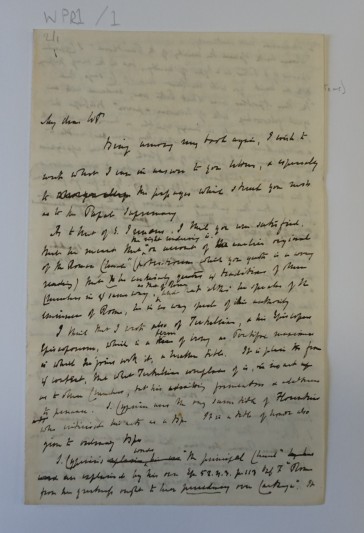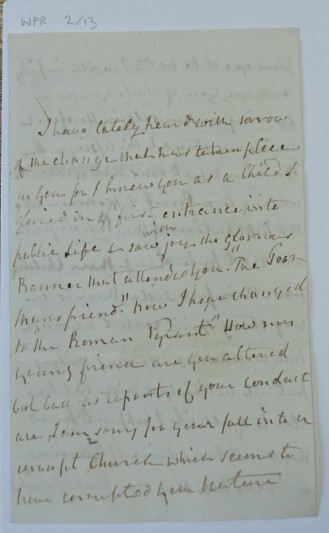Pusey House is home to the principal Anglo-Catholic library and archive in the UK. The House was founded in 1884 as a monument to the life and work of Dr Edward Bouverie Pusey (1800-1882), Professor of Hebrew at Oxford University and Canon of Christ Church Cathedral. The House supports the work of the University of Oxford by providing a chaplaincy together with a theology library of some 75,000 volumes, but is a stand-alone institution which does not receive University funding. Dr Pusey’s books and papers were purchased by his friends after his death as part of his memorial, and his collection continues to be updated with modern scholarly works to provide an important theological resource for the University and for the Church of England. We are also a collecting archive for the Anglo-Catholic wing of the Church of England, and house 12 miles of 19th-21st century manuscripts. Unsurprisingly, we hold the chief collection of Pusey’s correspondence and manuscripts, and we aim to acquire additional material whenever it becomes available.
Thanks to the assistance of a grant from the Friends of National Libraries, the archive has been able to secure an important set of correspondence between Dr Pusey and Francis Richard Wegg-Prosser. Wegg-Prosser (1824-1911) had been MP for Herefordshire from 1847, but had to step down on his conversion to the Roman Catholic Church in 1852. He later helped to re-found the Benedictine Monastic Community in England and built the pro-Cathedral for the diocese of Newport and Menevia. Their letters were exchanged in 1851, shortly before Wegg-Prosser’s conversion to Rome, and shed light on Pusey’s theological understanding of the place of Anglicanism in the wider Catholic Church.
In addition to the seven letters from Dr Pusey there are also 27 letters dating from 1847-1886 from other correspondents. These include fellow MP, J.G. Hubbard (later Baron Addington), Eugene Popoff, Orthodox chaplain to the Russian Embassy, and J.H. Pollen, Anglican priest, Roman Catholic convert and pre-Raphaelite writer on English craft. Unexpectedly, these have revealed a previously unrecorded attempt at reunion between Anglicans, Roman Catholics and Orthodox Churches spearheaded by Wegg-Prosser in 1850. There are also two anonymous poison pen letters making threats of damnation to Wegg-Prosser for his conversion to Rome, which bring to life the real difficulties still faced by Roman Catholics in the 1850s.
The collection is of core importance to our archive, both in terms of providing comprehensive coverage of the life and thought of Dr Pusey, and in providing primary material of the relationship between the Church of England and the Roman Catholic Church in the Victorian era. The item in the collection which has pleased me most, however, is the first line of the first letter from Dr. Pusey:
‘My Dear WP
Being among my books again…’ (Pusey House WPR 1/2 f. 1).
A brief catalogue of the Wegg-Prosser papers can be found here.

